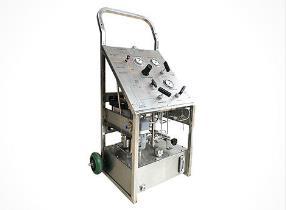A hydrostatic test pump is a specialized mechanical device used to provide regulated and precise hydraulic pressure for hydrostatic pressure testing on various components and systems.
I. Definition and function of a hydrostatic test pump
- Definition:
A hydrostatic test pump is a machine used to create specific levels of hydraulic pressure for conducting hydrostatic pressure testing. This testing process involves subjecting a vessel, system, or component to a predetermined pressure to ensure its structural integrity, leakage resistance, and overall safety.
- Function:
The primary function of a hydrostatic test pump is to simulate the conditions that a component or system will experience during regular operation by subjecting it to elevated hydraulic pressure. This pressure is applied gradually, allowing operators to monitor the behavior of the test subject and identify potential weaknesses, leaks, or defects.
II. Industrial Applications
Hydrostatic test pumps find diverse industrial applications where pressure testing is essential for ensuring safety, reliability, and compliance. Some key industrial applications include:
- Pipeline Testing:Hydrostatic test pumps are used to test the integrity of water, gas, oil, and chemical pipelines, ensuring they can withstand operational pressures without leaks or failures.
- Pressure Vessel Testing:Industrial tanks, containers, and boilers undergo pressure testing to verify their structural integrity and confirm that they can safely contain liquids or gases.
- Fire Protection Systems: Fire hoses, hydrants, and sprinkler systems are hydrostatically tested to ensure they can handle the pressure required for effective fire suppression.
- Construction Industry:Plumbing systems, HVAC equipment, and hydraulic systems are pressure tested to ensure they function as intended and meet safety standards.
- Aerospace Manufacturing:Aircraft components, fuel systems, and hydraulic lines undergo pressure testing to ensure they can handle the stress of flight and maintain safety.
- Automotive Industry: Radiators, fuel tanks, and hydraulic systems in vehicles are tested to ensure they can handle operational pressures and prevent leaks.
- Oil and Gas Sector:Hydrostatic testing verifies the pressure resistance of equipment like wellheads, valves, and pipelines used in exploration, production, and refining processes.
III. Emergency Response
- Emergency Stops:
Easily accessible emergency stop buttons are installed on test pumps for immediate shutdown in critical situations.
- First Aid and Medical Assistance:
Test pump operators are trained in first aid and are aware of the location of first aid supplies and medical assistance.
- Equipment Inspection:
Regular inspections of emergency shutdown systems and safety mechanisms are conducted to ensure their functionality.
- Communication Protocols:
Effective communication channels are established to notify relevant personnel and teams during emergencies.
- Training Drills:
Regular emergency response drills involving hydrostatic test pumps are conducted to ensure that personnel are well-prepared.
- Risk Assessment:
Emergency response plans are developed based on comprehensive risk assessments to address potential hazards.
Emergency response procedures for hydrostatic test pumps are critical for ensuring workers safety, preventing equipment damage, and successfully managing unforeseen events. Proper training, clear protocols, and well-prepared emergency plans all contribute to a quick and controlled response in critical situations.
IV. Conclusion
Hydrostatic test pumps are crucial tools for ensuring the safety, quality, and dependability of equipment in a variety of sectors. These pumps detect flaws, prevent leaks, and verify structural integrity by subjecting components to controlled pressures. This procedure not only protects against risks and failures but also guarantees adherence to rules and specifications. Hydrostatic test pumps serve an important role in preserving operating efficiency, decreasing downtime, and establishing confidence in equipment performance, eventually leading to safer workplaces and higher product quality.
Wingoil is a professional manufacturer of high-pressure equipment and a flow control solution provider in the oil & gas industry. We use advanced technology for Hydrostatic Pressure Test Pump, and can guarantee the accuracy and reliability of test data and the safety and controllability of testing.
If you have any needs, please contact us.


